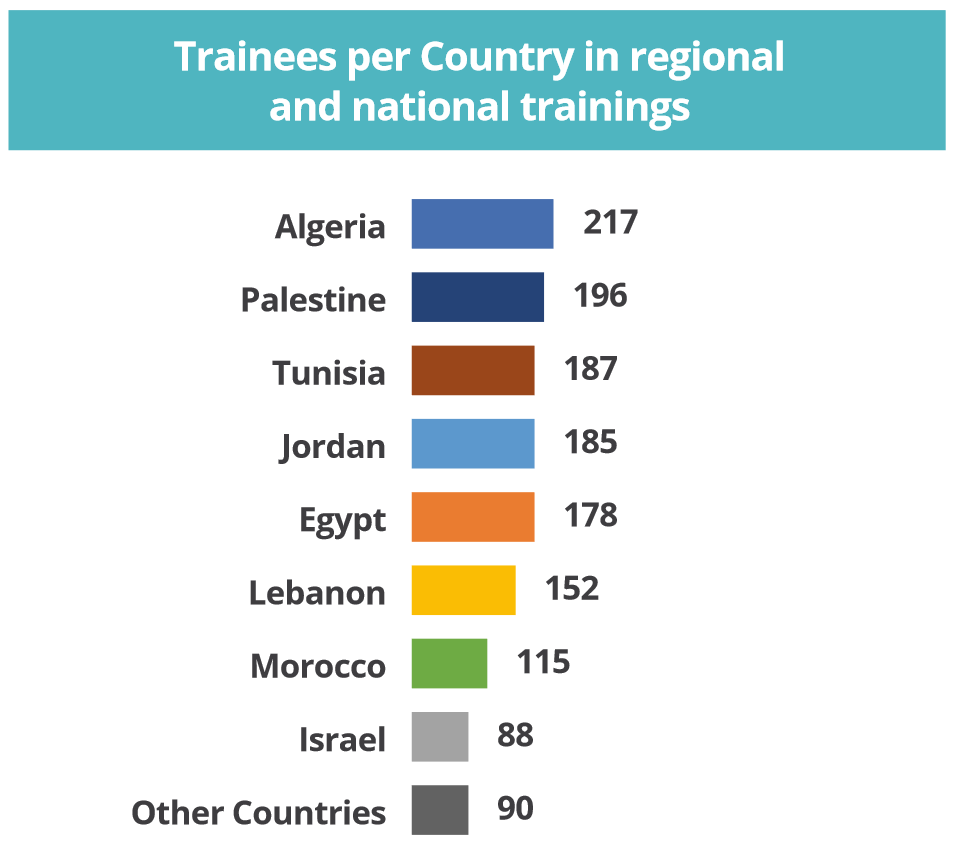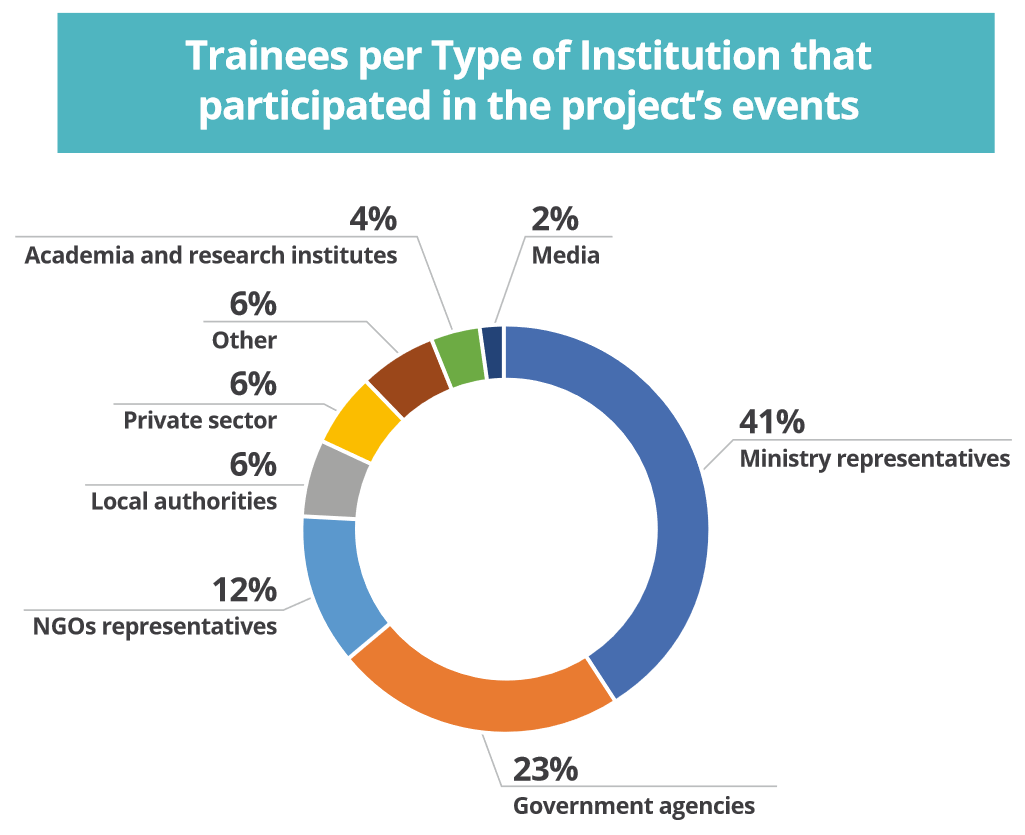News
SWIM and HORIZON2020 SM
The SWIM and H2020 Support Mechanism projects – Depollution of the Mediterranean & more sustainable use of scarce water resources – consists of two components, one on sustainable water management (SWIM Supporting Mechanism) and one on sustainable waste management (H2020 Supporting Mechanism). ACR+ is involved in the latter. The concept of the SWIM-H2020 SM regional project is based upon a combination of awareness-raising, policy advice, technical advice and capacity building.
Project co-financed by EuropAid.
Highlights
The project held its final conference on 8 April 2019 in Brussels, presenting the project’s results, achievements, and lessons learned to reduce marine pollution and promote a sustainable use of scarce water resources in the Mediterranean region.
A booklet provides a snapshot of the project detailing its approach, strengths, opportunities and the challenges it met. It reviews the activities implemented at regional level including regional trainings, study tours and Peer-to-Peer focus groups, and closes on lessons learnt and recommendations.
{slider THE PROJECT}
The key objective of the project is to contribute to reduced marine pollution and a more sustainable use of scarce water resources by providing tailored and targeted support to stakeholders of the Beneficiary Countries (BCs) within each of the six results areas. As such, the project aims to be a resource for BCs, to feed into their own work towards each of these end results, where relevant.
The approach to delivery of the SWIM-H2020 SM project is guided by three core elements:
- to operate as a regional programme that diligently applies the mandate of the UfM Ministerial Meetings and focuses on hands-on, experience-based joint activities and sharing/ exchanging of ideas, approaches and results;
- to be genuinely demand-led, responding to the needs of BC stakeholders, as identified through consultations and ongoing dialogue;
- and to construct activities that lead to identifiable and concrete results for the BCs and the region as a whole.
{slider ACTIVITIES}
The project addressed the following themes:
- policy and regulatory frameworks,
- facilitating sustainable investments,
- environmental impact assessments and strategic environmental assessments,
- hazardous waste,
- municipal waste,
- marine litter,
- urban wastewater,
- industrial emissions,
- environmental mainstreaming in sector policies.
National-level support targets priority areas identified in the updated National Action Plan.
- Algeria: Marine litter (Marine and coastal litter particularly characterization and development of a national management plan for coastal waste and marine litter)
- Egypt: Municipal Solid Waste (Support to the newly established National Solid Waste Management Agency and to facilitate its first steps, particularly implementation of WM plan, adapting a “Decentralized system” and community participation)
- Israel: Solid Waste Management (Plastic waste management and recycling, glass waste management and recycling, and Construction & Demolition waste management and recycling)
- Jordan: Green Economy (Sustainable Consumption & Production, Green Economy)
- Morocco: Marine litter reduction in 2 regions, and development of integrated management plan on marine litter for the coastal areas of two regions)
- Tunisia: Solid Waste Management (Capacity building for recovery and recycling of a variety of wastes with focus on rural areas) and Green Economy and Sustainable Consumption & Production).
{slider PROJECT IN NUMBERS}
The project ended with reaching impressive numbers: 14 regional and 51 national trainings, 6 study tours, 20 national consultations workshops, 16 national meetings, 10 peer-to-peer activities, and 4 webinars.


{slider MAIN TAKEAWAYS}
The project has contributed to developing a regional strategy based on the involvement of all the countries in the region. It has facilitated the implementation of shared objectives by reinforcing national capacities in the beneficiary countries and by raising awareness on the need to protect the Mediterranean Sea. The project also disseminated innovative approaches tested within EU funded demonstration projects and organised exchanges of good practices between the countries of the region.
Critical issues such as waste management, reduction of industrial emissions, green economy, efficient use of water and education on sustainable development overall have been tackled in a holistic manner.
This approach is the only way to offer a cleaner environment and the possibility for sustainable economic development for the people of the region.
The success of SWIM-H2020 SM has only been possible through the strong support and sense of ownership by the Partner Countries. The involvement of key regional organisations, such as the Union for the Mediterranean, the UN Environment/Mediterranean Action Plan, the European Environment Agency and the League of Arab States have played an important role in facilitating our work.
{slider FOLLOW-UP}
Building on the experiences gained through SWIM-H2020 SM a new project has been launched in May 2019, the Water and Environment Support in the ENI Southern Neighborhood region (WES) project. ACR+ joined this great opportunity to support the Southern Mediterranean Region for other four years full of inspiring challenges and is part of the project team.
{slider PARTNERS INVOLVED}
The SWIM and H2020 Support Mechanism projects' leader is LDK Consultants Engineers & planners S.A.
The project brings together partners from 9 countries:
- ACR+, Association of Cities and Regions for Sustainable Resource Management (BE)
- ACWUA, Arab Countries Utilities Association (JO)
- RAED, Arab Network for Environment and Development (EY)
- ARC, Catalan Waste Agency (hosting institution of Regional Activity Centre for Sustainable Consumption and Production (SCP/RAC)) (ES)
- EEIG UT-SEMIDE (FR)
- GLOBE ONE LTD. (GR)
- HASKONING, Royal Haskoning DHV Nederland B.V.(NL)
- LDK, LKD Consultants Europe. S.A. (BE)
- MIO-ECSD, Mediterranean Information Office for Environment, Culture and Sustainable Development (GR)
- MILIEU, Mileu Ltd. (BE)
- NKUA, National and Kapodistrian University of Athens (GR)
- UBA, Umweltbundesamt GmBH. (AT)
- ATKINS, WS Atkins International Ltd. (UK)
* ACR+ member
{/sliders}
More information: www.swim-h2020.eu










